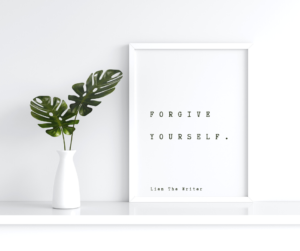I’m at a point in my life where peace is important. I’m sure we all are right? And though I reach for peace every single day, triggers still happen. A trigger is a response that happens when a person is reminded of a particular feeling or experience of the past. This response may bring up specific thought patterns and behaviors as a safeguard. Feeling the need to run away (flight mode) when you’re stressed is indeed a trigger response. I have found that building SELF-boundaries can help soothe this response and keep the peace.
WHAT IS SELF-BOUNDARIES?
Let’s break it down real quick. “Boundaries help you define what you are comfortable with and how you would like to be treated by others.” perfectly said by, https://www.loveisrespect.org/resources/what-are-my-boundaries/. Now coming from a SELF-boundary standpoint, it means the exact same, but instead we are defining how we would like to be treated by ourselves. Here’s my remix definition of self-boundaries:
Self-boundaries is a way to recognize where you are lacking in the relationship with yourself. Having these boundaries placed for yourself allows more peace in your life and within your relationships.
We highly encourage placing boundaries with other people, but I also think having boundaries with yourself is where it truly starts. Having boundaries with yourself is self-discipline in a nutshell and it looks something like this:
– Every morning I wake up, I go straight into my mindfulness practice. I give myself an allocated time to check my texts/calls so that the phone doesn’t distract me.
– Instead of staring at my phone waiting for their text, im going to find something productive to do.
As most of us know, checking your notifications in the morning can be VERY draining or even triggering. Your mornings set the tone for your day. If we get off to a bad start, then it’s likely the rest of the day will fall short. You want to wake up and tend to your needs first so that you feel like your BEST self. Building a strong boundary in the morning can help with this.
Now let’s talk about waiting for texts messages! This one is a BIGGIE in my trigger book. It is SO draining to my energy when I wait for text messages. To all my anxiously attached folks, ya’ll know it feels like the world has stopped temporarily until they respond. I hate this feeling. I decided building a self boundary would help with this. Instead of expecting people to be at my demand and respond *R. N R. N R. N* (right now), it’ll be best if I just find something to do. People have their own lives and issues they’re dealing with. Why would I expect them to respond to me right away? Building a boundary around this area has allowed me to become more at peace with myself, and it also allowed me to respect other people’s boundaries.
SIGNS YOU MAY NEED TO DEVELOP SELF-BOUNDARIES
We often think we need something from another person (love, respect, validation) when, in actuality, what we need is sitting within us. Something deep within you is lacking, which makes you feel reliant on another person/situation. This is how you know you may need to develop self-boundaries:
– You have a lack of respect for other people’s boundaries.
– Agitation when people don’t/do something.
– Impractical romantics definitely need self-boundaries (no questions asked)
– You feel life is a HOT mess.
– You’re very reliant on other people emotionally/mentally.
1. You have a lack of respect for other people’s boundaries
When you are having a hard time respecting someone else’s boundaries, you are substantially lacking in your own boundaries. Disrespecting someone else’s boundaries could simply be: calling someone in the morning when they specifically said wait till the afternoon. They are simply busy in the morning, and you calling them doesn’t change that or help! When you develop your own boundaries, you become more privy to other people’s needs cause you would expect the same respect.
2. Agitation when people don’t/do something
This one is famous in my book. Have you ever got so damn annoyed because someone didn’t call/text you back? YUP. I know it’s very annoying, BUT it doesn’t have to be. Once we’ve gotten to a point where everything a person does causes discord within our being, then we have temporarily lost our own power. To gain your power back, all you need to do is set a self boundary with yourself. Doesn’t it feel good to know that you have complete control of how you feel? In the upcoming category, I will go in detail on how you can implement your own self-boundaries.
3. Impractical romantics definitely need self-boundaries
Yes. Us hopeful/impractical romantics need self boundaries. We need self boundaries because it’s very easy for us to lose ourselves in romance. We love romance, so we’ll do anything for it. This can be a problem. Most of the time, our desires are unreachable because we look for the happily ever after love. The love with no issues, the white picket fence type love. And not that we aren’t able to withhold this love, but most of the time we haven’t yet met those requirements to get it. Most impractical romantics lack boundaries — we expect our partners to be just like us, we expect to receive the same love language we give out (which is super impractical), etc. Developing self-boundaries around your own self-love can really be beneficial in the advancement of your love life.
4. You feel life is a HOT mess
We’ve all been there, I would think. Especially in your 20s-30s life can be a HOT ASS mess. We’re trying to figure out who we really are, our placements in the world, family ties, etc. But with a little help from a self-boundary, this can make life become a little less stressful, more fun and organized. A quick example would be to get a planner and consistently write all your goals/responsibilities down. This brings structure into your life, allowing goals to be accomplished.
5. You’re very reliant on other people emotionally/mentally
I think we live in a very co-dependent world. Most of us look for validation from outside sources. Though this feels fantastic to receive that validation, too much dependency on outside validation, creates mistrust in your own validation.How would you know how to feel safe with your own words when you always search for it in another person? Developing self-boundaries can help heal co-dependent behaviors.
WHAT DOES YOUR INNER CHILD NEED TO FEEL SAFE?
HOW TO IMPLEMENT YOUR SELF-BOUNDARIES IN AREAS OF YOUR LIFE
In this section, we’re going to dive deeper into 3 areas of your life and ways to implement your self-boundaries.
– Love life
– Platonic/family relationships
– Work space
Within your LOVE life, self-boundaries can look like:
Tending to your own needs once you wake up in the morning. Instead of checking your notifications, try washing your face, brushing your teeth, drinking some water. Maybe listen to some nice groovy music, or even practice some yoga. Or maybe water your plants, opening the blinds to bring in the amazing sun energy. Do more things that’ll allow you to be more present and appreciative. This type of energy can help attract more pleasant experiences throughout the day or within your love life. There’s a special powerful energy when you show mad LOVE to yourself, especially in the mornings.
Within your platonic/family relationships, self-boundaries can look like:
It’s very interesting for family and friends. We expect them to be our knight and shining armor; we expect them to always hold it down and be there for us for our every bleeding need. And though in some circumstances, this is all so valid… but again, too much dependency can be very unhealthy. Self-boundaries can simply look like, understanding that even your child, best friend or your sister have their own life and problems. It can look like clear communication. It can look like expressed expectations. And though you express your expectations, doesn’t mean they can always meet it. Remember that people have their own lives, challenges, and needs and won’t always be able to show up for you in the way that you’d like. Accepting this truth is a self-boundary. A self-boundary can also look like removing yourself from a tie that is no longer serving you. If it is detrimental to your mental health, give it a break. It’s okay to take some time a way. This honestly applies to any area of your life.
Within your work space, self-boundaries can look like:
For the self-employed, it can look like setting a clear schedule for your day. Being self-employed can be a little crazy because everything relies on you to get it done. Having a set schedule can help keep your mind at ease and remind yourself of the responsibilities that need to be done. Also, setting a clear schedule can allow yourself to find free time within your day. I always encourage free time on a workday. Understand that there’s a quantum balance between actively achieving and doing absolutely nothing. For both non-self employed and self-employed, it can also look like being real with yourself and asking yourself, “is this really What I Want to do?” Being real with yourself in your work life can be very beneficial to you & your family in the future. Is this job helping me grow or keeping me stagnant? Is my health being compromised while I’m at work? Am I being underpaid? Getting into the habit of asking yourself these questions will help attract more abundant work into your life.
ATTACHMENT ISSUES (briefly)
It’s easy for me to get attached. I can get attached to foods, places, feelings, objects, and people. Once my brain processes that this person/place/thing feels really good, it builds multiple safeguards to prevent undesirable experiences from occurring. Mostly, this response often leads me to overconsumption, overindulging, and an heighten fear of abandonment. These behaviors happen because subconsciously I am afraid of losing whatever it is that feels good to me. Once my subconscious mind/inner child feels threatened, this leads me to fight/flight mode. It’s always been a constant battle for me… but I found a way to soothe these responses by establishing strong self-boundaries. I learned over time that my subconscious mind developed these strong attachments because internally I was lacking those needs that ‘X, Y, Z’ gave me. The brain is so powerful, if somewhere in there is lacking… it’ll look for that dopamine feeling in anything it finds pleasurable — which causes most addictions. So I said well hey, if my subconscious mind/inner child is looking to feel safe, warm, loved, then I should give her the healthiest/most accessible thing there is. Which is me. In your case, it’ll be you. We have easy access to ourselves 24/7. So since we have easy access to ourselves, since it’s more likely that we won’t disappoint ourselves, then it’ll be reasonable to show ourselves that love. Being the source of LOVE that your mind needs can bring so much peace internally and externally.
BALANCE
Loving on yourself can get sooo comfortable to where you may deny the love of others around you. I’ve definitely fallen down this trap before because I thought ‘well my love feels more safe, so I rather stay away from people that may disappoint me’. And though this has worked for a short period, it caused resentment within me. It is perfectly okay to show yourself love and attention, and accept the same from others. It is all easier said than done. Am I right? So let me show you two ways how:
In the morning I prefer to give myself all the love and attention possible, so I make sure that my notifications aren’t on and distracting me. Once I’m done with my daily morning rituals, I then tend to other outer-wordly affairs. This way, my mind and body are prepared and pampered for whatever the world has in store for me.
After a long hang out session with my friends/Family I highly encourage myself to tend to my needs next, whatever those needs are in that moment. Often I get so consumed in their company that I become super unmotivated to deal with my own responsibilities. Simple things like making sure I ate, showered, or finish a chore of mine can provide outstanding balance. OR just go to bed! That’s always a goodie. Remember, the goal is to tend to your needs but also be open to other people and activities.
Well, this is probably one of the longest articles I’ve written. I enjoyed this topic of self-boundaries and I hope you guys did as well! This is truly one of my biggest lessons in life, so I resonate with the concept whole-heartedly. Self-boundaries can be beneficial to your self-development journey. How will you add self-boundaries in your life today?
Until next time, Ciao!






